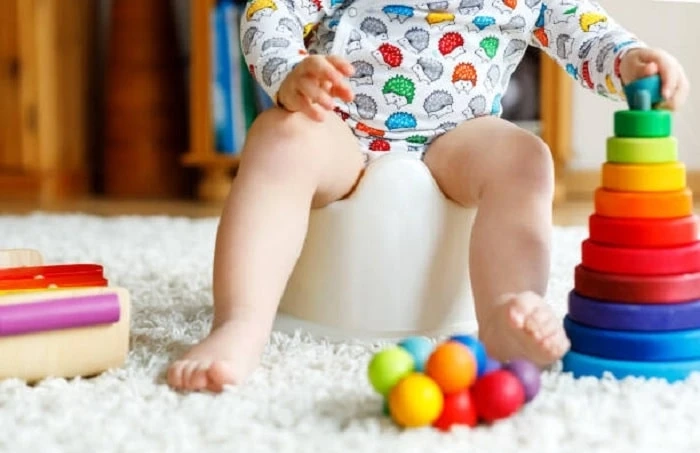I couldn\'t understand whether I should laugh or be angry, but my wife was very upset to see her baby playing with his own poop. She started to get angry at the same time because we had just arrived from outside. I had a good laugh because I imagined this to be how childhood is. Meanwhile, my wife said angrily to her child, "Why did you play with your poop?"
However, it was also my query: why do toddlers play with their poop? If you\'re a new parent, you might wonder the same thing I did about whether you experience these problems. Although it\'s a natural behavior of kids at a certain age, but if I reveal the issues, I hope you will be amazed to know. Check out MyTinyRider to get more information concerning baby toys.
Experts opinion about toddlers play with their poop:

According to Dr. Heather Wittenberg, author of Let’s Get this Potty Started,
“Holding a handful of poop or playing with it is a normal behavior for toddlers. Additionally, he asserted that it occurs more frequently in children under the age of two because at this time, toddlers attempt to master their own bodies.
According to Dr. Tanya Altmann, a pediatrician and author of "What to Feed Your Baby,"
"It\'s not uncommon for toddlers to play with their poop. They are curious about their bodies and the world around them, and this is just another way for them to explore. It\'s important for parents to remain calm and use these moments as teaching opportunities to explain why it\'s not safe or hygienic to play with feces."
Dr. Laura Jana, a pediatrician and co-author of "Heading Home with Your Newborn," also shares her thoughts on this behavior:
"Toddlers playing with their poop can be a normal part of their development as they learn about their bodies and their environment. It\'s essential for parents to address this behavior by reinforcing proper hygiene practices and providing alternative sensory activities to satisfy their child\'s curiosity and need for exploration."
Reasons why Toddlers play with their poop: Point by point explanation

It is important to understand that although it may seem gross to adults, for toddlers, it is simply a form of exploration. However, it is crucial to address this behavior to ensure hygiene and safety.
Here is a point-by-point explanation based on the facts:
1. Curiosity and readiness for potty training:
Playing with poop can indicate that a toddler is becoming curious about their bodily functions and may be ready to start potty training. This behavior presents an opportunity to introduce the concept of using the potty and teach appropriate bathroom etiquette.
2. Sensory exploration:
Poop has a unique texture, smell, and color, which can be intriguing to toddlers who are still developing their senses. Playing with poop may provide a sensory experience that is different from anything else they have encountered.
3. Attention-seeking:
Toddlers may play with poop as a way to get attention from their caregivers. Negative attention is still attention, and some toddlers may not yet understand the difference.
4. Control:
Toddlers are at a stage where they are learning to assert their independence and control over their environment. Playing with poop may be a way for them to feel in control of something.
5. Developmental delays:
In some cases, playing with poop may be a sign of a developmental delay or sensory processing disorder. If this behavior persists or is accompanied by other concerning symptoms, it is important to consult a healthcare professional.
If a parent notices that their child is still playing with their poop at the age of 3.5 to 4 years old, they should be aware that this is not a common occurrence. A pediatrician is someone you should consult.
How do I get my child to stop playing with her poop?

Let\'s go over the specifics of how you can prevent your child from playing with her feces.
Common 8 tips to follow:
1. Establish a consistent routine:
Create a regular schedule for potty training and bathroom breaks, helping your child understand when and where it is appropriate to handle their bodily functions. Consistency will reinforce the idea that playing with poop is not acceptable.
2. Reinforce hygiene:
Teach your child about the importance of handwashing and cleanliness. Explain why it is not safe or hygienic to play with their poop, and discuss the potential health risks associated with handling feces.
3. Provide alternative sensory activities:
Offer your child other sensory-rich activities, such as playing with playdough, finger painting, or exploring different textures. These alternatives can satisfy their curiosity and need for sensory input without resorting to playing with poop.
4. Stay calm and avoid overreacting:
If you discover your child playing with their poop, calmly and firmly explain that it is not appropriate. Redirect them to a more suitable activity. Overreacting may inadvertently reinforce the behavior by giving them the attention they seek.
5. Praise appropriate behavior:
When your child uses the toilet or potty correctly, offer praise and positive reinforcement. Encourage continued good behavior by acknowledging their efforts and successes in maintaining proper hygiene.
6. Monitor and supervise:
Keep an eye on your child during bathroom breaks and potty training sessions. Supervision can help prevent them from engaging in undesirable behaviors, such as playing with their poop.
7. Use child-proof locks:
If your child is accessing their diaper or the bathroom unsupervised, consider using child-proof locks on diaper pails, toilet lids, or bathroom doors to limit their opportunities to play with their poop.
8. Communicate with caregivers:
Ensure that all caregivers, such as babysitters or daycare providers, are aware of your child\'s behavior and the strategies you are using to address it. Consistency across all caregivers will help reinforce the message that playing with poop is not acceptable.
FAqs:
Is there a specific age Range When Playing with Poop is More Common Among Toddlers?
Yes, there is a specific age range when playing with poop is more common among toddlers. This behavior is typically observed in children between the ages of 2 and 3 years old.
- 10 year old playing with poop> Not normal, Seek doctors’ consult
- 7 year old playing with poop> Not normal, Seek doctors’ consult
- 5 year old playing with poop> Not normal, Seek doctors’ consult
Should I be concerned if my toddler continues to play with their feces?
If your toddler continues to play with their feces despite your efforts to address the behavior, it is understandable to be concerned. While occasional instances of this behavior can be considered normal for toddlers, persistent engagement in playing with feces may warrant further attention.
Here are some steps to consider if your toddler continues to play with their feces:
- Reevaluate your approach: Assess the strategies you have been using to address the behavior and consider whether any adjustments need to be made. Ensure that you are consistent in your response and that all caregivers are on the same page.
- Monitor for additional concerns: Observe your child for any other behavioral or developmental concerns that may be related to their fascination with feces. This could include issues with potty training, communication difficulties, or social challenges.
Are there any potential health risks associated with playing with poop?
Yes, there are potential health risks associated with playing with poop. It is important to understand that contact with feces can expose individuals to harmful bacteria, viruses, and parasites. Here are some key points:
- Healthline explains that straining to poop can potentially lead to health complications such as hemorrhoids, anal fissures, and rectal prolapse. These conditions can be uncomfortable and may require medical intervention.
- Holding in stool for an extended period can result in hard stool, making bowel movements more difficult and uncomfortable. This is more common in children, especially toddlers. It is important to encourage regular and timely bowel movements to avoid such issues.
- It is crucial to note that playing with someone else\'s feces or engaging in activities involving scavenging can significantly increase the risk of parasitic, bacterial, and viral infections. Direct contact with or ingestion of feces can expose individuals to various pathogens and harmful microorganisms.
What does it mean when a child eats their poop?
According to the study, if a child eats a small amount of feces and exhibits no symptoms, it is generally considered minimally toxic.
However, it is advised to contact a local poison center immediately for guidance in such situations. Eating feces can be associated with a condition called pica, where individuals have an appetite for non-food items.
In babies and toddlers, eating poop or other non-food items may be a part of natural exploration and developmentally appropriate behavior.
If you have concerns about your child eating their poop, it is recommended that you consult with a healthcare professional for further evaluation and guidance.
Final verdict: toddler playing with poop sign of autism
According to the study, there is a link between toddlers playing with poop and autism spectrum disorder (ASD).
Some children with autism may engage in scatolia, finding pleasure in the smell or texture of their poop and seeking sensory stimulation.
Additionally, children with ASD may experience gastrointestinal symptoms such as abdominal pain, constipation, and diarrhea more frequently than their peers.
However, it\'s essential to consult with a healthcare professional or specialist for a proper evaluation and diagnosis of autism if you have concerns about your child\'s behavior.



